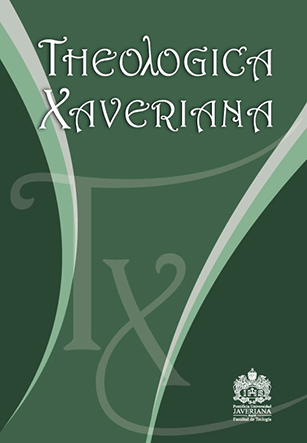Resumen
O presente estudo expõe um panorama sobre a questão do ensino superior no magistério da Igreja Católica. Estrutura-se em dois tópicos que focam, respectivamente, as raízes históricas do ensino superior, no âmbito do processo de institucionalização do cristianismo e os textos do magistério dedicados ao assunto. Afirma que a tradição escolástica e o Concilio Vaticano II constituem dois epicentros em torno dos quais gravita a questão, sendo esse último a referência fundamental para o diálogo entre a fé a razão no contexto da sociedade plural e tecnocientífica de nossos dias.
Calabi, Francesca. História do pensamento judaico-helenístico. São Paulo: Loyola, 2013.
_____. Fílon de Alexandria. São Paulo: Paulus, 2014.
Celam Os cristãos na universidade. Petrópolis: Vozes, 1968.
Concílio Vaticano II. Compêndio do Vaticano II. Petrópolis: Vozes, 1986.
_____. “Declaração Gravissimum educationis sobre a educação cristã”. In Compêndio do Vaticano II, 581-586. Petrópolis: Vozes, 1986.
Congregación para la Educación Católica. “Educar para o diálogo intercultural na escola católica. Vivir juntos una civilización de amor”. Vatican, http://www.vatican.va/roman_curia/congregations/ccatheduc/documents/rc_con_ccatheduc_doc_20131028_dialogo-interculturale_sp.html (acesso em 25 de Agosto de 2014).
De Aquino, Tomás. Suma teológica. Vol. IV. São Pulo: Loyola, 2005.
De Ridder-Symoens, Hilde. História da universidade europeia. Vol. I. Lisboa: Imprensa Nacional-Casa da Moeda, 1992.
Foulquié, Paul (org.). A Igreja e a educação. Rio de Janeiro: Agir, 1957.
Francisco. Exortação Evangelii gaudium. São Paulo: Paulinas, 2013.
_____. Encíclica Laudato si’. São Paulo: Paulus, 2015.
Grant, Edward. História da filosofia natural: do mundo antigo ao século XIX. São Paulo: Madras, 2009.
Jaeger, Werner. Cristianismo primitivo y paideia griega. Mexico: Fondo de Cultura Económica, 1999.
Japiassu, Hilton. Ciência e destino humano. Rio de Janeiro: Imago, 2005.
João Paulo II. Constituição apostólica Ex corde ecclesiae. São Paulo: Paulinas, 2000.
_____. Fides et ratio. São Paulo: Loyola, 1998.
Leão XIII. “Encíclica Aeterni patris (1879)”. In Documentos de Leão XXIII. São Paulo: Paulus, 2005.
_____. “Encíclica Rerum novarum (1891)”. In Documentos de Leão XXIII. São Paulo: Paulus, 2005.
Leers, Bernardino. Moral cristã e autoridade do magistério eclesiástico. Conflito-diálogo. Aparecida: Santuário, 1991.
Nemo, Philippe. O que é o Ocidente? São Paulo: Martins, 2005.
’Malley, John W. O que aconteceu no Vaticano II. São Paulo: Loyola, 2014.
Pio XI. Encíclica Divini illius magistri. Rio de Janeiro: Agir, 1957.
_____. “Deus scientiarum dominus. Consttución apostólica sobre las universidades y las facultades de estudios eclesiásticos”. Mercaba, http://www.mercaba.org/PIO%20XI/deus_scientiarum_dominus.htm (acesso em 25 de agosto de 2014).
Stein, Gesuída B. A educação nos documentos da Igreja Católica Apostólica Romana. Brasília: Universa Editora, 2001.
Tarnas, Richard. A epopeia do pensamento ocidental. Rio de Janeiro: Bertrand Brasil, 1999.
Theissen, Gerd. A religião dos primeiros cristãos: uma teoria do cristianismo primitivo. São Paulo: Paulinas, 2009.
Verger, Jacques. Cultura, ensino e sociedade no Ocidente nos séculos XII e XIII. Baruru: Edusc, 2001.
Vilanova, Evangelista. Historia de la teología cristiana. Vol. I. Barcelona: Herder, 1987.
Esta revista científica se encuentra registrada bajo la licencia Creative Commons Reconocimiento 4.0 Internacional. Por lo tanto, esta obra se puede reproducir, distribuir y comunicar públicamente en formato digital, siempre que se reconozca el nombre de los autores y a la Pontificia Universidad Javeriana. Se permite citar, adaptar, transformar, autoarchivar, republicar y crear a partir del material, para cualquier finalidad (incluso comercial), siempre que se reconozca adecuadamente la autoría, se proporcione un enlace a la obra original y se indique si se han realizado cambios. La Pontificia Universidad Javeriana no retiene los derechos sobre las obras publicadas y los contenidos son responsabilidad exclusiva de los autores, quienes conservan sus derechos morales, intelectuales, de privacidad y publicidad.
El aval sobre la intervención de la obra (revisión, corrección de estilo, traducción, diagramación) y su posterior divulgación se otorga mediante una licencia de uso y no a través de una cesión de derechos, lo que representa que la revista y la Pontificia Universidad Javeriana se eximen de cualquier responsabilidad que se pueda derivar de una mala práctica ética por parte de los autores. En consecuencia de la protección brindada por la licencia de uso, la revista no se encuentra en la obligación de publicar retractaciones o modificar la información ya publicada, a no ser que la errata surja del proceso de gestión editorial. La publicación de contenidos en esta revista no representa regalías para los contribuyentes.



